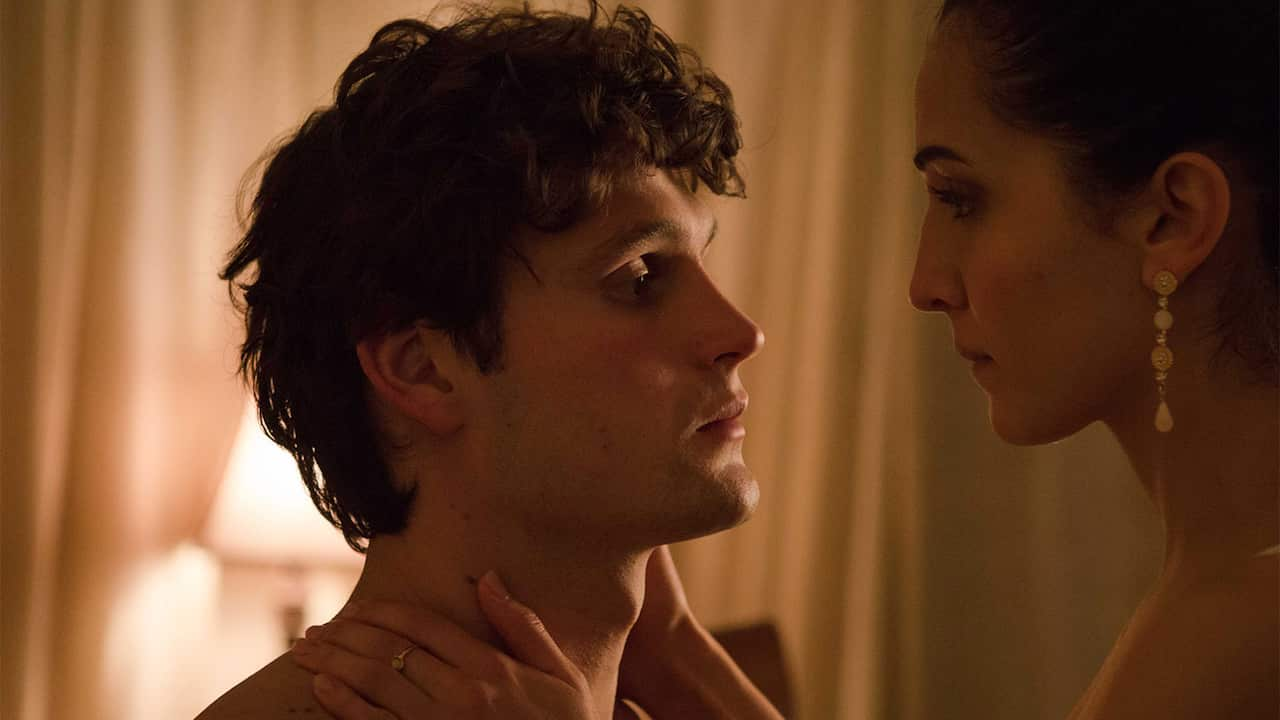Canberra, that artificial city built in the middle of the Australian bush, plays a pivotal role in this disturbing film based on Helen Garner’s 2004 nonfiction book of the same name. It’s as if Canberra itself – clean, bureaucratic and often accused of sterility – symbolises some kind of moral absence in our national community, a lack which allowed a terrible crime to occur and go largely unpunished.
Garner wrote about the legal case of Anu Singh, a law student at the Australian National University, who in 1997 drugged her boyfriend Joe with Rohypnol and administered a lethal dose of heroin. The case was particularly bizarre because Singh did this after throwing a dinner party where all the guests except Joe knew of her suicide-murder plan but did nothing to intervene.
In the opening scene of Sotiris Dounoukos’ film, an aerial camera hovers and soars above the city’s orderly suburbs and deserted streets as we hear in voiceover a distressed young woman making an emergency phone-call. She’s trying to get help, but worried she’s in big trouble because her boyfriend is vomiting blood. ‘Is that bad?’ she asks hysterically, reluctant to give the address. You can hear the disbelief in the ambulance despatcher’s voice as he says, ‘Well, it’s not good!’
Watch trailer:
The transcript of this phone call also appears at the start of Garner’s book, but where Garner dealt primarily with the aftermath of the death – the trial, the ongoing grief of Joe’s family, the culpability of the legal and psychiatric systems (which meant Singh served a mere four years in jail) – the film rightly limits itself to the lead-up and actual tragedy. Co-scripted by debut director Dounoukos and Matt Rubinstein, it’s an intriguing and tense narrative with enough questions of its own to ask and only partly answer: Why would an intelligent young woman want to kill her sweet, innocent boyfriend? And why did none of their friends stop her?
We first meet Anu (an excellent Maggie Naouri) three years earlier when she meets engineering student Joe (Jerome Meyer) in a pub and they quickly fall in love. He’s handsome and kind. She’s beautiful, exotic and slightly troubled. She tells him she has a bad reputation but he reassures her that love ‘never works out until it does,’ and they swiftly move in together.
Flash forward three years and Anu is failing at Uni and beset by a raft of mysterious health problems. She hates her body and blames Joe for giving her Ipecac to keep her weight down. She’s convinced she’s dying and that her competitive law student friends hate her. Her one ally is a shy fellow student Madhavi Rao (Sacha Joseph), who acts as handmaiden to Anu and helps her to plan the farewell dinner party where both Anu and Joe will die and end the suffering. The guests seem intrigued and disbelieving. After all, Anu is known for telling self-dramatising tall stories. But the drugs she procures are all too real.
It’s as if Canberra itself – clean, bureaucratic and often accused of sterility – symbolises some kind of moral absence in our national community.
There are moments when the film’s need to adhere to the known facts impedes its dramatic success. Joseph’s depiction of Madhavi Rao seems almost robotic, as if her dialogue is limited to court transcripts, and either intentionally or unintentionally this makes Rao appear the real villain of the piece. Some artistry is employed however in the depiction of Joe as a dying saint, with DOP Simon Chapman (The Loved Ones) painting him in sepia tones and lingering on his pale face and naked torso as he bleeds to death like Christ on the cross. This is perhaps Joe’s consolation, that he will always be remembered, and preserved as blameless and beautiful.
The recorded facts of this story are confusing, and to its credit the film realistically captures the confused state of mind of the main players without losing audience sympathy or interest. There’s a detached objectivity at play here as the inevitable disaster unfolds, and yet we long for one simple soul to step in and prevent it. It’s distressing, as it should be. Yet everyone around Anu seems too ‘cool’ or cowardly to get fully involved. The middle-class undergraduate mentality of the 1990s – recreational drug use, proudly multicultural dinner parties and the quoting of Socrates – is convincingly recreated, and the viewer can’t help asking if they themselves would have been clear-headed enough to intervene.
Watch 'Joe Cinque's Consolation'
SBS, Friday 20 october, 8.40pmAvailable afterwards at SBS On Demand

